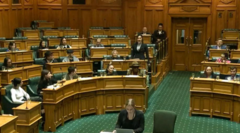Ekrem Imamoglu, the jailed opposition mayor of Istanbul, faces new restrictions as Turkish authorities block his social media account, leading to widespread protests demanding his freedom.
Silencing the Opposition: Turkey Blocks Jailed Mayor's Social Media Account

Silencing the Opposition: Turkey Blocks Jailed Mayor's Social Media Account
Authorities impede Ekrem Imamoglu's communications as protests erupt for his release.
Blocking access to Ekrem Imamoglu's social media account has sparked outrage in Turkey, as tens of thousands took to the streets of Istanbul on Wednesday night to demand his release. Imamoglu, the main contender against President Recep Tayyip Erdogan, has been in prison since March on corruption charges, which he vehemently denies. The Turkish authorities’ move to restrict his online communication follows his recent attempts to rally support from prison through social media, where he has amassed nearly 9.7 million followers on the platform X.
The ban prevents Imamoglu from sending messages to his supporters within Turkey, although his account remains accessible internationally. Just a day prior to the blocking, Imamoglu utilized his platform to condemn his arrest and the government's crackdown on dissent. His party, the Republican People's Party (CHP), has described this latest action as a testament to the government's fears of losing power—likening it to a coup against future elections.
The legal basis for blocking Imamoglu’s account was not immediately clear, but Istanbul prosecutors are reportedly investigating a prior post perceived as inciting unlawful behavior. His supporters assert that the judiciary in Turkey has been weaponized against political adversaries, undermining the independence of legal processes. In retaliation to the ban, some social media users have temporarily changed their profile pictures to express solidarity with Imamoglu.
Imamoglu remains incarcerated in a high-security prison, where he shares space with nearly 100 others who were arrested alongside him, including members of his political party. Advocates and human rights organizations have condemned these arrests as part of a broader attack on civil society and dissent. The escalating protests, the largest seen in Turkey in over a decade, erupted following his initial incarceration, although participation has waned in recent weeks.
Challenging the Turkish government's actions, Imamoglu’s lawyer has initiated a court appeal against the block, while the ongoing protests signal a significant undercurrent of public dissent against Erdogan's administration. With considerable support from the populace, many believe that if given the chance, Imamoglu would prevail in a future presidential election, currently scheduled for 2028. His growing influence and popularity pose a challenge to Erdogan, further intensifying the political tensions in the country.
The ban prevents Imamoglu from sending messages to his supporters within Turkey, although his account remains accessible internationally. Just a day prior to the blocking, Imamoglu utilized his platform to condemn his arrest and the government's crackdown on dissent. His party, the Republican People's Party (CHP), has described this latest action as a testament to the government's fears of losing power—likening it to a coup against future elections.
The legal basis for blocking Imamoglu’s account was not immediately clear, but Istanbul prosecutors are reportedly investigating a prior post perceived as inciting unlawful behavior. His supporters assert that the judiciary in Turkey has been weaponized against political adversaries, undermining the independence of legal processes. In retaliation to the ban, some social media users have temporarily changed their profile pictures to express solidarity with Imamoglu.
Imamoglu remains incarcerated in a high-security prison, where he shares space with nearly 100 others who were arrested alongside him, including members of his political party. Advocates and human rights organizations have condemned these arrests as part of a broader attack on civil society and dissent. The escalating protests, the largest seen in Turkey in over a decade, erupted following his initial incarceration, although participation has waned in recent weeks.
Challenging the Turkish government's actions, Imamoglu’s lawyer has initiated a court appeal against the block, while the ongoing protests signal a significant undercurrent of public dissent against Erdogan's administration. With considerable support from the populace, many believe that if given the chance, Imamoglu would prevail in a future presidential election, currently scheduled for 2028. His growing influence and popularity pose a challenge to Erdogan, further intensifying the political tensions in the country.























